浅谈出国留学论文
高二议论文中学生出国留学弊大于利议论文
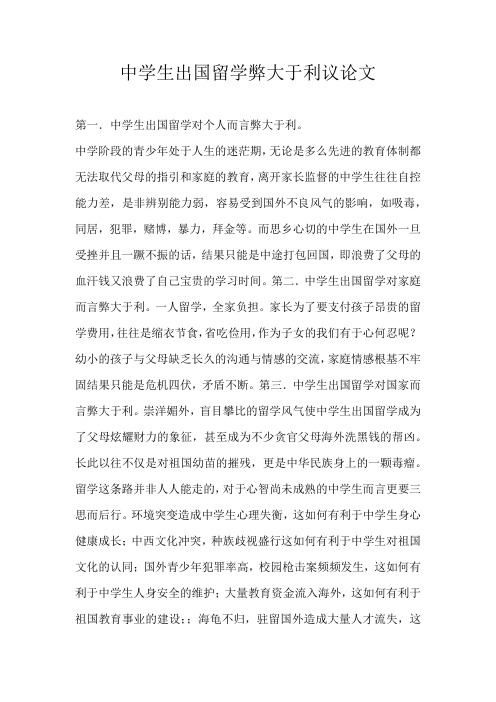
中学生出国留学弊大于利议论文第一.中学生出国留学对个人而言弊大于利。
中学阶段的青少年处于人生的迷茫期,无论是多么先进的教育体制都无法取代父母的指引和家庭的教育,离开家长监督的中学生往往自控能力差,是非辨别能力弱,容易受到国外不良风气的影响,如吸毒,同居,犯罪,赌博,暴力,拜金等。
而思乡心切的中学生在国外一旦受挫并且一蹶不振的话,结果只能是中途打包回国,即浪费了父母的血汗钱又浪费了自己宝贵的学习时间。
第二.中学生出国留学对家庭而言弊大于利。
一人留学,全家负担。
家长为了要支付孩子昂贵的留学费用,往往是缩衣节食,省吃俭用,作为子女的我们有于心何忍呢?幼小的孩子与父母缺乏长久的沟通与情感的交流,家庭情感根基不牢固结果只能是危机四伏,矛盾不断。
第三.中学生出国留学对国家而言弊大于利。
崇洋媚外,盲目攀比的留学风气使中学生出国留学成为了父母炫耀财力的象征,甚至成为不少贪官父母海外洗黑钱的帮凶。
长此以往不仅是对祖国幼苗的摧残,更是中华民族身上的一颗毒瘤。
留学这条路并非人人能走的,对于心智尚未成熟的中学生而言更要三思而后行。
环境突变造成中学生心理失衡,这如何有利于中学生身心健康成长;中西文化冲突,种族歧视盛行这如何有利于中学生对祖国文化的认同;国外青少年犯罪率高,校园枪击案频频发生,这如何有利于中学生人身安全的维护;大量教育资金流入海外,这如何有利于祖国教育事业的建设;;海龟不归,驻留国外造成大量人才流失,这如何有祖国现代化事业的建设,如何有利于中华民族的长远发展。
哈佛大学的校长曾说过,中国的基础教育实际上是世界一流的。
综上所述,我方建议中学生应该先在国内打下坚实的学习基础,积累丰富的人生经验,将来才能更好的为祖国发展和世界沟通做出自己的贡献,才能振兴中华于世界文明之林。
天生我材必有用,外国的月亮未必比中国的圆,而中学生出国留学更是弊大于利。
出国留学看法作文英文

出国留学看法作文英文英文:When it comes to studying abroad, I have mixed feelings. On one hand, I think it can be an incredible opportunity to broaden your horizons and gain new experiences. Living in a foreign country can expose you to different cultures, languages, and ways of thinking that you might notencounter otherwise. Plus, studying at a prestigious international university can provide you with a top-notch education and valuable connections.However, there are also some potential downsides to studying abroad. For one thing, it can be expensive.Tuition fees, living expenses, and travel costs can quickly add up, and not everyone has the financial resources to support themselves abroad. Additionally, studying in a foreign language can be challenging, especially if you're not already fluent. It can be frustrating to struggle with coursework or social interactions because of a languagebarrier.Despite these challenges, I think studying abroad can be a worthwhile experience for many people. I have a friend who studied abroad in Spain and loved it so much that she ended up staying there for several years after graduation. She learned Spanish fluently, made lifelong friends, and gained a new perspective on the world. Another friend of mine studied abroad in Japan and was able to immerseherself in the country's unique culture and traditions. She also gained valuable skills in cross-cultural communication and adaptation.Ultimately, I think the decision to study abroad depends on a variety of factors, including your personal goals, financial situation, and language abilities. It's important to do your research and consider all of the pros and cons before making a decision.中文:说到出国留学,我有着复杂的感受。
海外留学优点和缺点英语作文

海外留学优点和缺点英语作文Studying abroad has become an increasingly popular choice for students seeking to broaden their horizons and gain valuable life experiences. While the decision to study overseas can be both exciting and daunting, it is important to weigh the potential benefits and drawbacks before embarking on this journey. This essay will explore the key advantages and disadvantages of studying abroad.One of the primary advantages of studying abroad is the opportunity to immerse oneself in a new culture. By living and learning in a foreign country, students can gain a deeper understanding and appreciation for different customs, traditions, and ways of life. This cultural exposure can foster a greater sense of global awareness and cultural sensitivity, skills that are highly valued in today's increasingly interconnected world. Additionally, the experience of navigating a new environment and adapting to unfamiliar surroundings can help students develop important life skills, such as problem-solving, adaptability, and independence.Another significant benefit of studying abroad is the chance todevelop language proficiency. Depending on the host country, students may have the chance to learn or improve their fluency in a foreign language. This linguistic development can not only enhance academic and professional opportunities but also enrich personal relationships and social interactions. The ability to communicate effectively in multiple languages is a valuable asset in an increasingly globalized job market, and can open doors to a wide range of career paths.Furthermore, studying abroad provides students with the chance to expand their academic and intellectual horizons. By engaging with different educational systems, teaching methodologies, and areas of study, students can gain a fresh perspective on their chosen field of study. This exposure to diverse academic approaches can stimulate critical thinking, encourage creative problem-solving, and foster a deeper understanding of one's own field of study. Additionally, the opportunity to take courses or participate in research projects that may not be available at their home institution can broaden the scope of a student's educational experience.In terms of personal growth, studying abroad can be a transformative experience. The challenges and adjustments inherent in living and learning in a new environment can lead to increased self-awareness, independence, and resilience. Students may be required to navigate unfamiliar social situations, manage their ownfinances, and make decisions without the support of family and friends. These experiences can foster a greater sense of self-confidence and self-reliance, qualities that are highly valued in both academic and professional settings.However, it is important to acknowledge the potential drawbacks of studying abroad. One of the most significant challenges is the financial burden. Studying in a foreign country can be significantly more expensive than studying at a domestic institution, with costs ranging from tuition and housing to travel and living expenses. This financial strain can be particularly difficult for students from lower-income backgrounds, potentially limiting access to international educational opportunities.Another potential drawback of studying abroad is the sense of cultural and social isolation that some students may experience. Adapting to a new culture, language, and social norms can be a daunting and overwhelming process, and some students may struggle to form meaningful connections with their peers or integrate into the local community. This sense of isolation can lead to feelings of homesickness, loneliness, and even depression, which can negatively impact academic performance and overall well-being.Additionally, studying abroad may present logistical challenges, such as navigating unfamiliar bureaucratic systems, securing appropriatevisas and documentation, and ensuring access to necessary resources and support services. These practical hurdles can add significant stress and complexity to the study abroad experience, potentially detracting from the overall academic and personal growth that students hope to achieve.It is also important to consider the potential disruptions to one's academic progress that studying abroad may cause. Depending on the program and the host institution, students may face challenges in transferring credits, aligning course schedules, and ensuring that their academic progress remains on track. This can lead to delays in graduation, additional financial burdens, and the need to carefully plan and coordinate their academic journey.In conclusion, the decision to study abroad is a complex one, with both significant advantages and potential drawbacks. On the one hand, studying abroad can provide students with invaluable cultural, linguistic, academic, and personal growth opportunities, expanding their horizons and preparing them for success in an increasingly globalized world. On the other hand, the financial, social, and logistical challenges inherent in studying abroad can present significant barriers and disruptions to a student's academic and personal well-being.Ultimately, the decision to study abroad should be carefullyconsidered, weighing the potential benefits against the potential drawbacks. Students should thoroughly research their options, seek guidance from academic advisors and international education professionals, and develop a comprehensive plan to address the challenges they may face. By doing so, students can maximize the transformative potential of the study abroad experience and emerge as more globally-minded, adaptable, and resilient individuals.。
出国留学英语作文(优秀9篇)
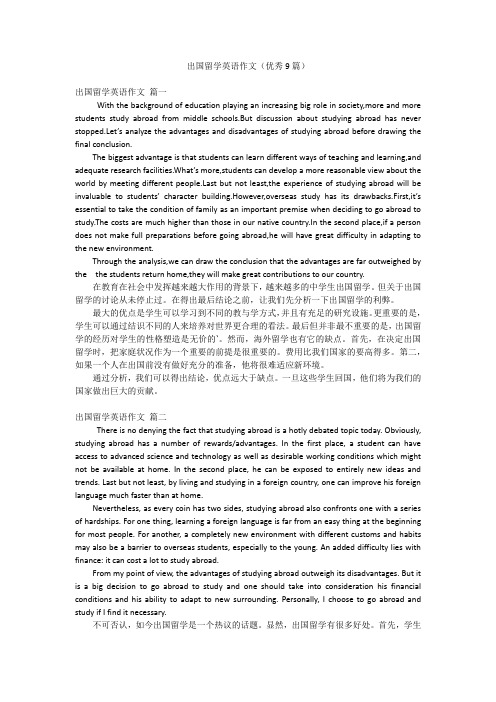
出国留学英语作文(优秀9篇)出国留学英语作文篇一With the background of education playing an increasing big role in society,more and more students study abroad from middle schools.But discussion about studying abroad has never stopped.Let’s analyze the advantages and disadvantages of studying abroad before drawing the final conclusion.The biggest advantage is that students can learn different ways of teaching and learning,and adequate research facilities.What’s more,students can develop a more reasonable view about the world by meeting different st but not least,the experience of studying abroad will be invaluable to students’ character building.However,overseas study has its drawbacks.First,it’s essential to take the condition of family as an important premise when deciding to go abroad to study.The costs are much higher than those in our native country.In the second place,if a person does not make full preparations before going abroad,he will have great difficulty in adapting to the new environment.Through the analysis,we can draw the conclusion that the advantages are far outweighed by the the students return home,they will make great contributions to our country.在教育在社会中发挥越来越大作用的背景下,越来越多的中学生出国留学。
出国留学的好处作文

出国留学的好处作文
首先,出国留学是学习一门语言的最佳途径没有比融入讲这种语言的文化更好、更有效的方法了,留学可以让你接触到另一种文化第一手文化的差异不仅仅是语言食物和个人习惯学生亲身体验文化差异可以真正了解真正的差异第三,留学可以给你机会去旅行和交朋友,并拓宽视野你的视野学习的优势/劣势学习的优势/劣势毫无疑问,去一个有着其语言和文化的外国学习,可能是一个令人沮丧的,有时甚至是痛苦的经历,但海外学习有其缺点,困难远大于优点,出国留学的人会有这样的经历:留在国内的人永远不会对海外大学学习有最大的好处,那就是在现实生活中使用不同的语言,而一个人可以在自己的国家学习一门外语,它无法与在学术和日常生活中经常使用这种语言相比,没有比生活在讲这种语言的国家更好的机会来提高第二语言技能了,在学习期间使用过这门语言对于在国内申请大学校园里需要这种语言的工作有着明显的优势,留学生并不是唯一一个从遥远的地方来的人,他或她可能会遇到许多来自海外的人,并有可能结交来自世界各地的朋友这不仅在社会层面上令人兴奋,而且可能在以后的职业生涯中带来重要的海外接触。
最后,留学和生活提供了一个机会一种全新的、不同的世界观,也许最重要的是,对自己国家的看法一旦超越了身处新文化的最初冲击,学生们在回国后就开始慢慢地对东道国社会有了有意义的了解,人们不可避免地会在一个新的、往往更具欣赏力的国家里看到自己的国家,总而言之,尽管对出国读大学的任何焦虑都是可以理解的,但重要的是要记住,这种经历所带来的好处使它非常值得。
关于国外留学的观点英语作文英语作文

关于国外留学的观点英语作文英语作文全文共4篇示例,供读者参考关于出国学习的英语作文篇1going abroad for studiesthe other day i announced that i would go abroad for further studies right after my college education. my decision evoked the immediate objection of my family:why? why should i borrow a huge sum of money for overseas studies while i might receive the same education at home at relatively low cost? my answer is:in addition to knowledge,i can gain experience that those who stay at home will never have.first,experience is the opportunity for the real-life use of foreign languages. while a person can study a foreign language at home,the effect can never be compared with constant use of the language in academic and everyday life. there is no better opportunity to improve second-language skills than living in the country in which it is spoken. living in english-speaking countries such as america and australia for several years,for example,my english will be as perfect as native speakers.second,living and studying abroad offers me a different perspective of the world. on a university campus,foreign students are likely to encounter their counterparts from different countries and areas and are exposed to different ideas and values. this helps me to have a meaningful understanding of different societies and inevitably sees my own country in a new light.third,overseas experience,frustrating and painful as it may be,is helpful. a person going abroad for study often experiences much more difficulty——difficulty in adapting to a new culture and in dealing with all problems alone. yet,the difficulty,coupled with the frustration brought on by culture shock,is a rewarding experience for one's future life and development of personality.although going abroad is expensive and perhaps painful,the payoff is worthwhile. for the benefit is not merely knowledge gained,but the experience desirable in one's personal life.关于出国学习的英语作文篇2today, even-increasing people think studying abroad is a good approach to students. i think its main advantage is that students can learn foreign languages better because of the good language environment. it helps them to improve the level offoreign languages. outstanding language level can enhance their core competition when finding jobs in the future. secondly, studying abroad provides people golden opportunities to expand their horizon and learn advance foregin technology. moreover, it is useful to spread and exchange different culture. however, there exist numbers of disadvantages. first, those who go to abroad for studying usually are much young. generally specking, they lack of experience of life and cannot take good care of themselves. second, students will feel lonely and miss their hometowns, especially on spring festival and mid-autumn festival. furthermore, living and tuition generally are too high that people cannt afford it. so, if you want to study abroad, you should consider the above points carefully.关于出国学习的英语作文篇3it’s a common phenomenon that more and more students chose to go abroad for further study. there exists a common phenomenon that…there is a growing trend that an increasing number of students prefer to… 一些人认为国外留学令我们受益匪浅some people hold the view that studying abroad may benefit us a lot. 而另一些人认为对我们有很多负面影响while others argue that it may have many negative impacts on our life. 就我而言,我同意前者(后者),我的理由如下:as far as i’m concerned/ in my opinion, i’m in favor of the former/latter. my reasons are listed as follows.生活在说英语的国家里有助于快速提高口语we will make rapid progress in oral english when living in an english –speaking country. 频繁的接触英语使得我们能更好的更好的掌握语言being exposed to english frequently enables us to have a good command of this language.independence遇到困难,独立解决棘手问题,这令我们更加独立和成熟。
出国留学的优势和挑战作文150字

出国留学的优势和挑战作文150字
案例一:
出国留学,你还能够体验不一样风格的教育。
攻读留学课程,你有机会在留学国家接触有关你专业的信息,而这些信息你可能无法在国内获取。
你也会发现,沉浸在留学国家的教育体制,能够很好地真正了解当地的人们,以及体验他们的传统和文化。
毕竟,攻读留学课程,教育是其中的核心,而选择适宜的院校也是十分重要的。
出国留学就是挑战自我,能磨练我们的意志。
挑战自我,能搬炼我们的能力,挑战自我,能增强我们的信心。
假如没有挑战,将只有无尽的自卑、懦弱。
我们需要挑战,呼唤挑战。
因为有了挑战,能唤醒我们沉睡的信心,能融化由自卑感累积起来的坚固的冰层。
案例二:
出国留学会让你有机会结识世界各国的朋友。
这些人可能是你的室友、同学、良师、生活好伴侣,他们来自不一样文化、不一样种族。
拥有众多的国外朋友能够让你的人生阅历更加丰富,与价值观不一样的朋友交往,能够有效地提高自我的沟通本事。
拥有国际人脉,以后出国游玩、出差都比较方便,也对于未来的职业发展有着必须的帮忙。
出国留学是一个很好的机会,可以学到很多东西,参观有趣的地方,认识新朋友。
学生在国外
面临的最常见的桃战,首先是克服语言障碍。
高一议论文中学生出国留学要自强

中学生出国留学要自强近几年,中学生出国留学温持续上升。
于是关于中学生出国留学利与弊的讨论也是众说纷纭。
而我认为,中学生出国留学关键在与自身。
我们必须要自强。
外国的教育模式在于“寓教娱乐”,主要培养学生的创造力,让学生在时间学习、进步。
中学生出国留学从呆板的中国式教育解脱出来,进入一个新模式,将自己潜在的创造思维发掘出来。
但并不是没个出国留学的中学生都能够成功。
着名作家刘镛的儿子刘轩现在是哈佛大学的博士生,而且还获得过全美音乐艺术优异奖。
但在他的着作也写过,与他一同到美国的朋友,并不像他一样能够取得如此成就,反而有好几位朋友忍不住外国文化的侵入,走上了黑道;更有的终日无所事事,无心向学,后来因为成绩太差而被学校辞退。
同样在外国读书,同样的教育,为什么会有如此的差异呢?这就是完全取决于学生本身。
外国有其良好的学习条件和环境,但在五光十色的外过文化中。
一些中学生就容易迷失自己。
使自己深陷在物质的漩涡中不可自拔。
中学生的自制能力差。
所以到了环境宽松的外国就很容易走进思想的误区,如赌博、偷窃,有的甚至犯下更严重的错误。
一位准留学生的母亲对记者这样说:“近年来,关于海外留学生的负面报道常常见诸报端,从生活习惯不良、学业欠佳,甚至升级到打架、勒索等。
作为家长,我为他们感到痛心,也为我的孩子担忧,不知道把孩子送出去究竟是令他开阔眼界早日成才,还是把他推进了‘火坑’。
”中学生出国留学是为了学习外国的先进文化和技术,把学到的东西带回祖国学以致用。
俗语说:哪里的月光都一样。
只有学生自身的努力才能取得好成绩,就像在中国学英语与在美国学英语一样,如果是刻苦学习,无论在中国还是在美国都能学的很好。
只是美国多了一个语言环境和习惯罢了!只有我们自强自立,不要迷失在物质里,即使利用别人的环境,知识加上自己的基础和自身的刻苦学习也会取得成就!。
出国留学好处和弊端英语作文
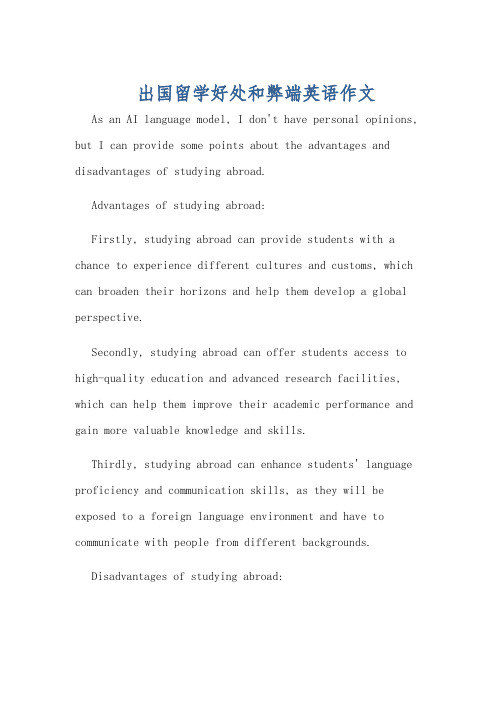
出国留学好处和弊端英语作文As an AI language model, I don't have personal opinions, but I can provide some points about the advantages and disadvantages of studying abroad.Advantages of studying abroad:Firstly, studying abroad can provide students with a chance to experience different cultures and customs, which can broaden their horizons and help them develop a global perspective.Secondly, studying abroad can offer students access to high-quality education and advanced research facilities, which can help them improve their academic performance and gain more valuable knowledge and skills.Thirdly, studying abroad can enhance students' language proficiency and communication skills, as they will be exposed to a foreign language environment and have to communicate with people from different backgrounds.Disadvantages of studying abroad:Firstly, studying abroad can be very expensive,including tuition fees, accommodation, food, transportation, and other expenses, which can put a heavy financial burden on students and their families.Secondly, studying abroad can be challenging, asstudents may face various difficulties and obstacles, such as cultural shock, language barriers, homesickness, and academic pressure, which can affect their mental health and well-being.Thirdly, studying abroad may also pose risks tostudents' safety and security, as they may encounterdifferent social and political situations, such as discrimination, racism, violence, and terrorism, which can endanger their personal safety and health.总之,出国留学有其利有其弊,需要学生根据自身情况和需求来做出决策,并做好充分的准备和规划,以克服各种挑战和迎接各种机遇。
关于出国留学的看法

关于出国留学的看法出国留学一直是许多人向往的目标,对于这一话题,我有着自己的看法和理解。
在我看来,出国留学是一个极具挑战的过程,不仅对于留学生本人而言,也对于家庭和社会产生较大的影响。
以下是我对于出国留学的一些看法:一、出国留学是一个难得的机会出国留学可以让留学生接触到不同的文化背景和思想观念,打破了我们传统教育的局限性。
留学生能够在国外的环境中学习和体验不同的知识和技能,这些对于他们的职业生涯和未来的发展都有着非常重要的影响。
此外,留学生在国外的学习和生活中,也能够锻炼自己的生活能力和人际交往能力,为其今后的成长和发展奠定了坚实的基础。
二、出国留学需要考虑实际问题尽管出国留学有着很多好处和机会,但同时也需要考虑实际问题。
首先,需要关注费用问题。
出国留学需要支付相对较高的学费和生活费用,同时还需要预留足够的经济来源,以应对在国外的各种突发状况。
其次,需要了解留学国家的移民政策和留学生生活要求。
对于留学生来说,他们需要适应新的文化环境和学习模式,同时也需要遵守当地的法律法规。
最后,要考虑留学后的发展问题。
留学生需要考虑自己的留学成果是否能够为其今后的职业生涯带来增值,是否能够在回国后更好地发挥自己的才能和能力等等。
三、出国留学应当具备一定的背景和准备出国留学需要具备一定的背景和准备。
首先,需要有足够的语言能力。
很多国家的教学语言是英语,因此留学生需要具备相对完善的英语交流能力,以应对在国外学习和生活中的各种问题。
其次,需要有足够的专业背景和技能。
留学生应当具备一定的专业背景和技能,才能更好的融入留学国家的学术环境,更好地完成学业和科研工作。
同时,在准备留学前,应当做好相关的申请流程和材料准备,以确保留学过程的顺利进行。
综上所述,出国留学是一个极具挑战和机会的过程,需要我们认真考虑和准备。
在出国留学之前,我们应当仔细分析是否值得出国留学,同时也需要考虑到自身和家庭的实际情况,做好相关的准备和预算。
在留学期间,留学生应当积极适应新的文化环境和学习模式,努力提升自己的语言能力和专业技能,最终为其未来的职业生涯做好充分的准备。
出国留学的好处和坏处英语作文
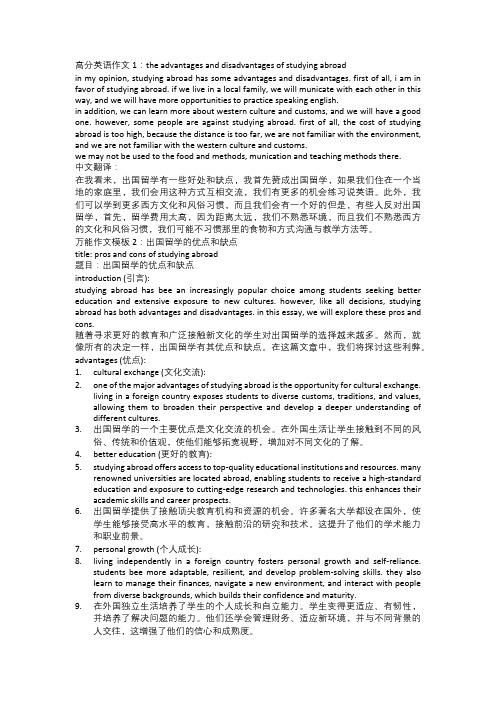
高分英语作文1:the advantages and disadvantages of studying abroadin my opinion, studying abroad has some advantages and disadvantages. first of all, i am in favor of studying abroad. if we live in a local family, we will municate with each other in this way, and we will have more opportunities to practice speaking english.in addition, we can learn more about western culture and customs, and we will have a good one. however, some people are against studying abroad. first of all, the cost of studying abroad is too high, because the distance is too far, we are not familiar with the environment, and we are not familiar with the western culture and customs.we may not be used to the food and methods, munication and teaching methods there.中文翻译:在我看来,出国留学有一些好处和缺点,我首先赞成出国留学,如果我们住在一个当地的家庭里,我们会用这种方式互相交流,我们有更多的机会练习说英语。
谈谈在国外留学的看法英语作文
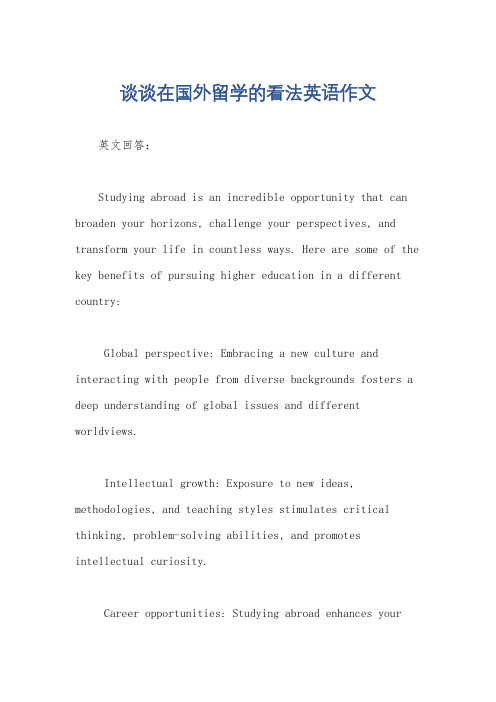
谈谈在国外留学的看法英语作文英文回答:Studying abroad is an incredible opportunity that can broaden your horizons, challenge your perspectives, and transform your life in countless ways. Here are some of the key benefits of pursuing higher education in a different country:Global perspective: Embracing a new culture and interacting with people from diverse backgrounds fosters a deep understanding of global issues and different worldviews.Intellectual growth: Exposure to new ideas, methodologies, and teaching styles stimulates critical thinking, problem-solving abilities, and promotes intellectual curiosity.Career opportunities: Studying abroad enhances yourresume by demonstrating your adaptability, cross-cultural competence, and language proficiency, which are highly sought-after qualities in today's globalized job market.Independence and self-reliance: Overcoming cultural barriers, navigating unfamiliar environments, and managing your own affairs builds resilience, independence, and self-confidence.Personal enrichment: Immersing yourself in a different culture allows you to discover new passions, values, and perspectives, fostering personal growth and self-discovery.Language skills: Studying abroad provides an unparalleled opportunity to improve your language proficiency through daily interactions, coursework, and cultural immersion.Network building: You will connect with fellow international students, local residents, and professionals, expanding your network and forging lifelong connections.Adventure and exploration: Studying abroad offers the chance to explore new countries, experience different landscapes, and embrace unfamiliar customs, creating unforgettable memories and enriching your life experiences.While studying abroad can be challenging at times, itis an incredibly rewarding and transformative experience that can shape your future in profound ways. Embrace the opportunity to immerse yourself in a new culture, expand your horizons, and grow both academically and personally.中文回答:我认为在国外留学是一段宝贵经历,能拓宽视野、挑战思维、并以各种方式改变生活。
我对留学的看法的英文写作
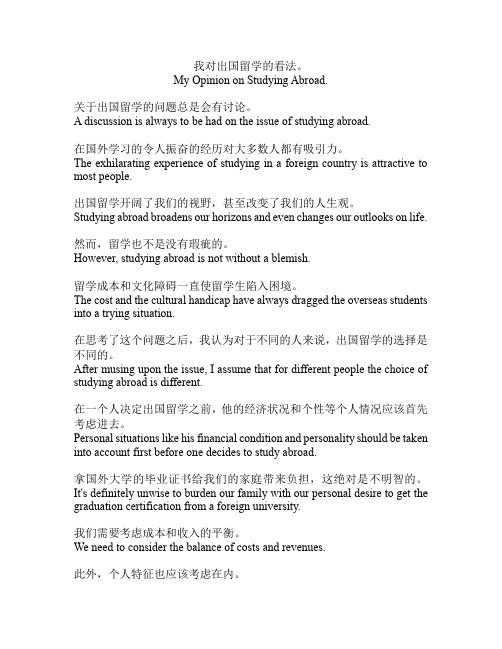
我对出国留学的看法。
My Opinion on Studying Abroad.关于出国留学的问题总是会有讨论。
A discussion is always to be had on the issue of studying abroad.在国外学习的令人振奋的经历对大多数人都有吸引力。
The exhilarating experience of studying in a foreign country is attractive to most people.出国留学开阔了我们的视野,甚至改变了我们的人生观。
Studying abroad broadens our horizons and even changes our outlooks on life. 然而,留学也不是没有瑕疵的。
However, studying abroad is not without a blemish.留学成本和文化障碍一直使留学生陷入困境。
The cost and the cultural handicap have always dragged the overseas students into a trying situation.在思考了这个问题之后,我认为对于不同的人来说,出国留学的选择是不同的。
After musing upon the issue, I assume that for different people the choice of studying abroad is different.在一个人决定出国留学之前,他的经济状况和个性等个人情况应该首先考虑进去。
Personal situations like his financial condition and personality should be taken into account first before one decides to study abroad.拿国外大学的毕业证书给我们的家庭带来负担,这绝对是不明智的。
对出国留学的看法

对出国留学的看法出国留学一直以来都是一个备受关注的话题,也是许多国内大学生的梦想之一。
究竟出国留学的好处和坏处是什么呢?本文将从多个角度探讨对出国留学的看法。
1. 语言能力提升对于大多数想要出国留学的人来说,语言能力提升往往是其中一个最重要的原因。
在新的环境下,人们需要学会使用一门新的语言,这将对其语言能力提升起到很大的帮助作用。
相信每个留学生在刚到达目的地的时候,刚开始面对异国语言都会觉得比较困难,然而只要熟能生巧,渐渐地就能够适应并掌握该语言。
通过不断地学习,可以提高留学生的语言水平,也让交流变得更加便利。
2. 文化交流出国留学的最大好处就是可以让人们家从不同的文化中获得新的经验和灵感。
在国外留学期间,留学生可以体验到当地的文化,更好地了解世界,这将对其带来很大的启示。
通过学习文化差异,留学生可以更好地理解文化的由来和各种社会角色的作用,从而更好地理解人类的多样性。
3. 教育水平提高除了语言能力的提升,出国留学可以让人们获得更高的教育水平。
在国外,人们可以接触到许多不同的学科和课程,学习的内容也远远超出国内的常规教育范畴。
同时留学生也可以接触到各种教育体系的优秀思想和方法,并将之运用到自己的学习中。
在这样的环境下,留学生可以培养出对未来职业的追求和追求。
4. 就业机会对于很多留学生来说,做出这样的决定是希望能够在国际化的工作环境中有所突破。
在国外学习和工作的经历,可以让留学生学到很多不同于国内的经验,并为其打开就业之路。
这不仅能够让人们的个人价值不断地提高,也可让人们的心理价值不断地增加。
5. 家庭压力虽然出国留学会带来很多好处,但是也必须面对一些困难和挑战。
其中一个主要的挑战是留学费用的压力。
出国留学需要花费大量的费用,并且还需要解决签证和学校申请的许多问题。
这也会让留学生的父母承受更大的经济负担。
对于一些经济困难的家庭,出国留学可能不是最理想的多研选。
6. 适应问题出国留学的一个大问题是适应问题。
出国留学的优点和缺点英语作文
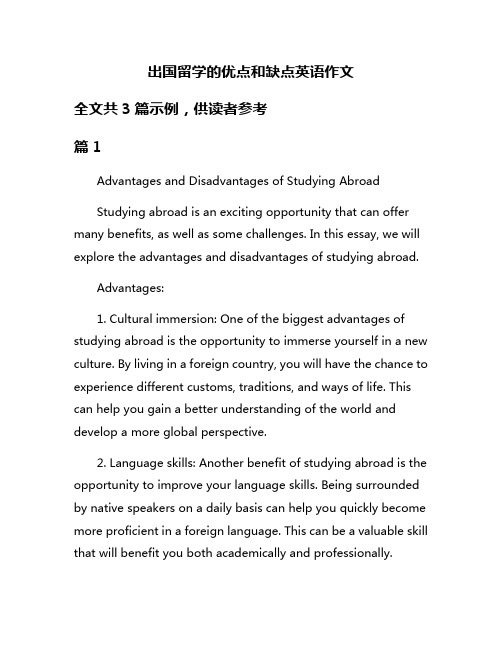
出国留学的优点和缺点英语作文全文共3篇示例,供读者参考篇1Advantages and Disadvantages of Studying AbroadStudying abroad is an exciting opportunity that can offer many benefits, as well as some challenges. In this essay, we will explore the advantages and disadvantages of studying abroad.Advantages:1. Cultural immersion: One of the biggest advantages of studying abroad is the opportunity to immerse yourself in a new culture. By living in a foreign country, you will have the chance to experience different customs, traditions, and ways of life. This can help you gain a better understanding of the world and develop a more global perspective.2. Language skills: Another benefit of studying abroad is the opportunity to improve your language skills. Being surrounded by native speakers on a daily basis can help you quickly become more proficient in a foreign language. This can be a valuable skill that will benefit you both academically and professionally.3. Education quality: Many students choose to study abroad because of the high quality of education available in other countries. By attending a prestigious university or college in a foreign country, you can receive a top-notch education that will enhance your academic credentials and open up new career opportunities.4. Personal growth: Studying abroad can also help you develop personally and grow as an individual. You will be pushed out of your comfort zone and forced to adapt to a new environment, which can help you become more independent, confident, and resilient.5. Networking opportunities: Studying abroad can also provide you with valuable networking opportunities. You will have the chance to meet people from all over the world, including fellow students, professors, and professionals in your field. These connections can be beneficial for your future career prospects.Disadvantages:1. Homesickness: One of the biggest challenges of studying abroad is dealing with homesickness. Being far away from your family and friends can be difficult, especially if you are in a newcountry where you don't know anyone. It can be hard to adjust to a new environment and cope with feelings of loneliness.2. Language barrier: While studying abroad can help you improve your language skills, it can also be a source of frustration and anxiety. Trying to communicate in a foreign language can be challenging, especially if you are not yet fluent. This can make it difficult to interact with locals, navigate daily life, and succeed academically.3. Cultural differences: Living in a foreign country means that you will encounter cultural differences that may be unfamiliar or uncomfortable. You may struggle to adapt to new customs, social norms, and ways of thinking. This can lead to misunderstandings, conflicts, and feelings of alienation.4. Financial costs: Studying abroad can be expensive, with costs that include tuition, housing, food, transportation, and other expenses. It can be challenging to manage a budget and afford the high cost of living in some countries. Financial concerns can add stress and pressure to an already challenging experience.5. Academic challenges: Studying abroad may present academic challenges, such as a different education system, teaching style, and grading system. It can be difficult to adjust toa new academic environment and meet the expectations of professors and peers. This can lead to academic stress, anxiety, and a decline in performance.In conclusion, studying abroad offers many advantages, such as cultural immersion, language skills, education quality, personal growth, and networking opportunities. However, it also comes with some disadvantages, such as homesickness, language barrier, cultural differences, financial costs, and academic challenges. It is important to carefully consider these pros and cons before making the decision to study abroad. Ultimately, the experience of studying abroad can be a transformative and life-changing opportunity that can help you grow academically, professionally, and personally.篇2Advantages and Disadvantages of Studying AbroadStudying abroad is a dream for many students around the world. It offers the opportunity to experience a new culture, learn a new language, and gain valuable skills and experiences that can enhance one's academic and career prospects. However, studying abroad also comes with its own set of challenges anddrawbacks. In this essay, we will explore the advantages and disadvantages of studying abroad.Advantages:1. Cultural immersion: One of the biggest advantages of studying abroad is the opportunity to immerse yourself in a new culture. By living and studying in a foreign country, you can gain a deeper understanding of the people, traditions, and customs of that country.2. Language skills: Studying abroad is a great way to improve your language skills. By interacting with native speakers on a daily basis, you can quickly improve your proficiency in a new language.3. Career opportunities: Studying abroad can enhance your career prospects by providing you with a global perspective and valuable international experience. Many employers value the skills and knowledge gained through studying abroad.4. Personal growth: Studying abroad can help you develop independence, resilience, and adaptability. It can also broaden your horizons, challenge your assumptions, and help you grow as a person.5. Networking: Studying abroad can provide you with the opportunity to build a global network of contacts and friends. These connections can be valuable in both your personal and professional life.Disadvantages:1. Cost: Studying abroad can be expensive, with tuition fees, living expenses, and travel costs adding up quickly. Financial constraints can make it difficult for some students to study abroad.2. Homesickness: Being away from family, friends, and familiar surroundings can lead to feelings of loneliness and homesickness. Adjusting to a new culture and way of life can also be challenging.3. Language barrier: While studying abroad can enhance your language skills, the initial language barrier can make communication difficult and lead to feelings of isolation.4. Cultural differences: Cultural differences can lead to misunderstandings, conflicts, and challenges in adapting to a new way of life. It can take time to adjust to a new culture and overcome cultural barriers.5. Academic challenges: Studying in a foreign language or adjusting to a different education system can be challenging. It may take time to adapt to new teaching styles, expectations, and academic requirements.In conclusion, studying abroad offers a wealth of opportunities for personal, academic, and career growth. However, it also comes with its own set of challenges and drawbacks. It is important to carefully consider the advantages and disadvantages of studying abroad before making the decision to pursue this exciting opportunity.篇3Advantages and Disadvantages of Studying AbroadStudying abroad is a dream for many students around the world. It offers a chance to explore new cultures, improve language skills, and gain a global perspective on life. However, along with the benefits, there are also challenges that come with studying in a foreign country. In this essay, I will discuss the advantages and disadvantages of studying abroad.Advantages:1. Cultural immersion: One of the biggest advantages of studying abroad is the opportunity to immerse oneself in a newculture. Students get to experience new traditions, customs, and ways of life that broaden their understanding of the world.2. Language skills: Studying abroad is a great way to improve language skills. Being surrounded by native speakers helps students practice and improve their language abilities in a natural and interactive way.3. Global perspective: Studying in a foreign country provides students with a global perspective on different issues. They learn to see things from different angles and develop a broader understanding of the world.4. Career opportunities: Studying abroad can open up new career opportunities for students. Employers value candidates with international experience and language skills, making graduates more competitive in the job market.5. Personal growth: Living in a foreign country forces students to step out of their comfort zones and become more independent. It helps them develop resilience, adaptability, and problem-solving skills.Disadvantages:1. Homesickness: Being away from family and friends can bea major challenge for students studying abroad. Homesickness can lead to feelings of loneliness, sadness, and isolation.2. Language barriers: While studying abroad can improve language skills, language barriers can still be a significant challenge. It can be difficult to communicate effectively in a new language, leading to misunderstandings and frustrations.3. Cultural differences: Adjusting to a new culture can be challenging for some students. They may experience culture shock, difficulty in understanding social norms, and discrimination.4. Financial constraints: Studying abroad can be expensive, with costs including tuition fees, accommodation, food, transportation, and travel. Managing finances can be difficult for students on a limited budget.5. Academic challenges: Studying in a different educational system can present academic challenges for students. They may struggle with unfamiliar teaching styles, grading systems, and coursework requirements.In conclusion, studying abroad has both advantages and disadvantages. It offers a unique opportunity for personal andacademic growth, but also comes with challenges such as homesickness, language barriers, cultural differences, financial constraints, and academic challenges. Despite the difficulties, the benefits of studying abroad can outweigh the drawbacks, providing students with a valuable and life-changing experience.。
出国留学的利弊作文

出国留学的利弊作文
出国留学的利弊。
随着全球化的不断发展,出国留学已经成为了很多人的选择。
出国留学有着诸多的利与弊,我们需要全面地了解这些利弊,才能做出正确的选择。
首先,出国留学的利大于弊。
出国留学可以让人接触到不同的文化,拓宽自己的视野,增加见识,提高自己的综合素质。
在国外留学,学生可以接触到先进的教育理念和教学方法,可以学习到更加专业的知识和技能,提高自己的学术水平。
此外,出国留学还可以增加人际关系,结交来自不同国家的朋友,拓展人脉,为将来的发展打下良好的基础。
最重要的是,出国留学可以提高自己的语言能力,学习一门外语,更好地与世界各地的人进行交流。
然而,出国留学也有着一定的弊端。
首先是高昂的费用,包括学费、生活费、住宿费等,这些费用对于一部分家庭来说是一个巨大的负担。
其次是文化冲突和适应问题,由于国外的文化和生活方式与国内有很大的不同,很多留学生很难适应新的环境,导致心理压力增加,甚至出现适应困难的情况。
此外,出国留学还可能导致
家庭和朋友的离别之痛,留学生需要离开自己的家人和朋友,独自
面对异国他乡的一切,这对于一些人来说是一个极大的心理负担。
综上所述,出国留学的利大于弊。
出国留学可以让人接触到不
同的文化,提高自己的综合素质,拓宽自己的视野,增加见识。
虽
然出国留学也存在一些弊端,如高昂的费用、文化冲突和适应问题、家人和朋友的离别之痛等,但是这些问题都可以通过努力克服。
因此,我认为出国留学是一件值得推荐的事情,只要我们能够克服困难,努力学习,就一定能够在国外留学期间取得成功。
关于我对出国留学的看法英语作文
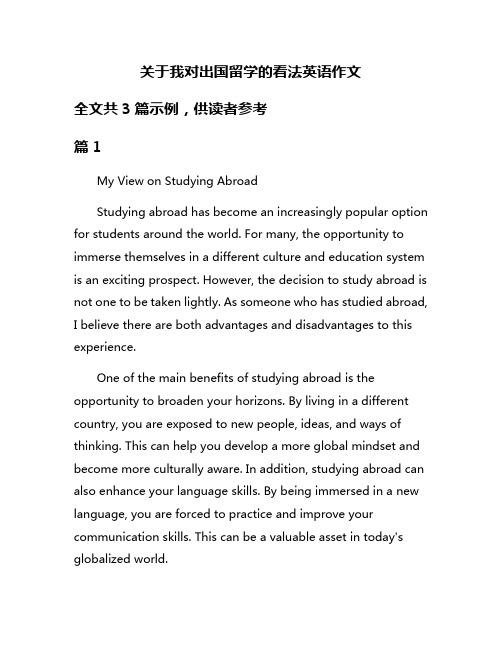
关于我对出国留学的看法英语作文全文共3篇示例,供读者参考篇1My View on Studying AbroadStudying abroad has become an increasingly popular option for students around the world. For many, the opportunity to immerse themselves in a different culture and education system is an exciting prospect. However, the decision to study abroad is not one to be taken lightly. As someone who has studied abroad, I believe there are both advantages and disadvantages to this experience.One of the main benefits of studying abroad is the opportunity to broaden your horizons. By living in a different country, you are exposed to new people, ideas, and ways of thinking. This can help you develop a more global mindset and become more culturally aware. In addition, studying abroad can also enhance your language skills. By being immersed in a new language, you are forced to practice and improve your communication skills. This can be a valuable asset in today's globalized world.Furthermore, studying abroad can also provide you with a more competitive edge in the job market. Employers often value the skills and experiences that come from studying in a different country. It shows that you are adaptable, independent, and willing to take risks. These are all qualities that can help you stand out in a competitive job market.Despite these advantages, studying abroad does come with challenges. One of the main drawbacks is the cost. Studying abroad can be expensive, and many students struggle to afford it. In addition, living in a different country can be challenging. You may experience homesickness, culture shock, and language barriers. It can be difficult to adjust to a new environment and establish a social support system.In conclusion, studying abroad is a valuable experience that can have many benefits. It can help you develop important skills, broaden your horizons, and enhance your employability. However, it also comes with challenges that should not be overlooked. It is important to carefully consider your own goals and motivations before making the decision to study abroad. If you are willing to embrace the challenges and opportunities that come with studying in a different country, it can be a truly rewarding experience.篇2My View on Studying AbroadStudying abroad has always been a hot topic among students and parents. Some people think it's a great opportunity to broaden their horizons and gain valuable experiences, while others believe it's a waste of time and money. Personally, I believe that studying abroad is a great way to enhance one's knowledge, skills, and perspective on life.First of all, studying abroad allows students to immerse themselves in a different culture and language. It offers a unique opportunity to experience new ways of thinking, living, and interacting with people from diverse backgrounds. This exposure can help students develop a global mindset and become more open-minded and tolerant individuals. Moreover, studying in a foreign country can also improve language skills, as students are forced to communicate in a new language on a daily basis.Secondly, studying abroad can provide students with access to world-class education and research facilities. Many universities and colleges abroad are renowned for their academic excellence and cutting-edge research. By studying in such institutions, students can learn from top professors andresearchers in their field, gaining valuable insights and knowledge that may not be available in their home country.Furthermore, studying abroad can help students build a strong international network of contacts and friends. These connections can be invaluable in the future, both personally and professionally. By studying abroad, students can establish relationships with people from around the world, creating opportunities for collaboration, exchange, and mutual support in their future endeavors.In addition, studying abroad can also enhance students' career prospects. Employers increasingly value candidates with international experience, as they are seen as more adaptable, culturally aware, and globally-minded. Studying abroad can provide students with a competitive edge in the job market, opening up a wider range of career opportunities both at home and abroad.However, studying abroad is not without its challenges. It can be a daunting experience to leave behind family and friends and adapt to a new environment. Students may face language barriers, cultural differences, and homesickness. It requires courage, resilience, and a willingness to step out of one's comfort zone. Nevertheless, the rewards of studying abroad faroutweigh the challenges, and the personal growth and development that one can achieve are priceless.In conclusion, I believe that studying abroad is a valuable and transformative experience that can enrich one's life in many ways. It offers the opportunity to gain new knowledge, skills, and perspectives, build international connections, and enhance career prospects. It may be a challenging journey, but the benefits are well worth the effort. I highly recommend studying abroad to anyone who is considering it, as it can be alife-changing experience that will shape your future in ways you never imagined.篇3Studying abroad has always been a dream for many students around the world. The opportunity to experience a new culture, learn a foreign language, and receive an education from a prestigious university is an enticing prospect for those looking to expand their horizons and broaden their perspective on the world.I, too, have always harbored the desire to study abroad. The idea of immersing myself in a different society, meeting new people, and facing the challenges of living independently in aforeign country excites me. The thought of expanding my knowledge and gaining a global perspective on my field of study is also a compelling reason for wanting to pursue this opportunity.One of the main reasons I believe studying abroad is valuable is the chance to gain a new perspective on the world. By living in a different country, I would be exposed to different customs, traditions, and ways of thinking that would challenge and expand my own understanding of the world. This experience would not only enrich my personal life but also enhance my academic and professional development.Furthermore, studying abroad provides the opportunity to improve language skills. Immersing oneself in a foreign language environment is one of the most effective ways to become fluent in a language. Communication is key in today's globalized world, and being proficient in more than one language is a valuable asset in any career.Another benefit of studying abroad is the opportunity to build a global network of contacts. Meeting students from around the world and establishing connections with professors and professionals in the host country can open doors to future collaborations and career opportunities. The internationalexperience gained from studying abroad is highly valued by employers who are looking for candidates with a diverse and global perspective.On the other hand, studying abroad also comes with its challenges. Adapting to a new culture, navigating a foreign education system, and managing the logistics of living in a different country can be daunting tasks. However, overcoming these challenges can lead to personal growth and development. The resilience, adaptability, and independence gained from studying abroad are qualities that will serve me well in both my personal and professional life.In conclusion, studying abroad is a transformative experience that offers numerous benefits and opportunities for personal and academic growth. It is a chance to step outside of one's comfort zone, broaden horizons, and gain a global perspective on the world. While the challenges may be daunting, the rewards of studying abroad are well worth the effort. I am excited about the prospect of studying abroad and look forward to the opportunities and experiences that lie ahead.。
出国留学的利与弊英语作文

出国留学的利与弊英语作文The Pros and Cons of Studying Abroad。
Studying abroad has become a popular option for many students seeking to further their education. While there are many benefits to studying in a foreign country, there are also some drawbacks. In this essay, we will explore the pros and cons of studying abroad.One of the main advantages of studying abroad is the opportunity to experience a new culture. Living in a foreign country allows students to immerse themselves in a different way of life, and to learn about different customs and traditions. This can be a valuable experience, as it can help students develop a greater understanding and appreciation for other cultures. Additionally, studying abroad can also improve language skills, as students are often required to speak and write in a different language.Another benefit of studying abroad is the opportunityto gain a global perspective. By living in a different country, students can gain a better understanding of global issues and develop a broader worldview. This can be particularly valuable for students who are studyingsubjects such as international relations or global business. Studying abroad can also provide students with the opportunity to make new friends and connections from around the world, which can be beneficial for their future careers.However, studying abroad also has its drawbacks. One of the main disadvantages is the cost. Studying in a foreign country can be expensive, as students often have to pay for tuition, accommodation, and living expenses. This can be a significant financial burden for many students, and may make studying abroad inaccessible for some.Another potential drawback of studying abroad is the challenge of adjusting to a new culture. Living in aforeign country can be difficult, and students may experience feelings of homesickness and loneliness. Additionally, students may also struggle with language barriers and communication difficulties, which can make itdifficult to fully engage with their studies.In conclusion, studying abroad has both advantages and disadvantages. While it can provide students with valuable cultural experiences and a global perspective, it can also be expensive and challenging. Ultimately, the decision to study abroad should be carefully considered, taking into account both the benefits and drawbacks.。
关于国外留学的观点英语作文英语作文

关于国外留学的观点英语作文英语作文全文共3篇示例,供读者参考篇1Title: Views on Studying AbroadStudying abroad has become increasingly popular in recent years, with more and more students choosing to pursue their education in a foreign country. There are a multitude of reasons why individuals may choose to study abroad, ranging from the desire to experience a new culture, to the opportunity to learn a foreign language, to the chance to gain a new perspective on global issues. In this essay, I will explore the various viewpoints on studying abroad and discuss the benefits and challenges of this experience.One of the main benefits of studying abroad is the opportunity to immerse oneself in a new culture. Living in a foreign country allows students to experience different customs, traditions, and ways of life, which can broaden their horizons and deepen their understanding of the world. By interacting with people from diverse backgrounds, students can develop agreater appreciation for cultural diversity and learn to see the world through a different lens.Furthermore, studying abroad provides students with the chance to learn a new language. In many cases, students are required to study in a language other than their native tongue, which can be a valuable opportunity for linguistic growth. Learning a new language not only enhances communication skills, but also opens up new possibilities for personal and professional development. Being able to speak multiple languages is a valuable asset in today's globalized world, and studying abroad can help students gain proficiency in a new language.Another advantage of studying abroad is the opportunity to gain a new perspective on global issues. By living in a different country, students can see firsthand how different societies address social, political, and environmental challenges. This exposure can help students develop a more nuanced understanding of global issues and inspire them to become more engaged global citizens. Studying abroad can also foster empathy and compassion for people from different backgrounds, leading to a more inclusive and interconnected world.However, studying abroad is not without its challenges. Adapting to a new culture and environment can be difficult, especially for students who are far from home for the first time. Homesickness, language barriers, and cultural differences can all create feelings of isolation and alienation. Additionally, navigating the academic system in a foreign country can be challenging, as students may encounter different teaching styles, grading systems, and expectations. It is important for students to be prepared for these challenges and to seek support from their peers, professors, and support services on campus.In conclusion, studying abroad offers a wide range of benefits, from cultural immersion to language learning to global perspective. While there are challenges associated with studying abroad, the rewards far outweigh the difficulties. By taking the leap to study in a foreign country, students can expand their horizons, deepen their understanding of the world, and gain valuable skills and experiences that will shape their future careers and personal lives. Studying abroad is a transformative experience that can enrich the lives of students and contribute to a more interconnected and inclusive society.篇2Title: Perspectives on Studying AbroadIntroductionStudying abroad has become increasingly popular among students in recent years. The opportunity to experience a new culture, learn a new language, and expand one's horizons is seen as valuable by many. However, there are also challenges and considerations to take into account when deciding whether or not to study abroad.Benefits of Studying AbroadOne of the main benefits of studying abroad is the opportunity to immerse oneself in a new culture. By living in a different country, students can gain a deeper understanding of that country's customs, traditions, and way of life. This can help them develop a broader perspective and become moreopen-minded individuals.Another benefit is the chance to learn a new language. Being surrounded by native speakers and practicing the language in real-life situations can significantly improve one's language skills. In today's globalized world, being bilingual or multilingual can be a valuable asset.Furthermore, studying abroad can enhance one's academic and professional prospects. Universities and employers oftenvalue the experience of studying abroad, as it demonstrates independence, adaptability, and cross-cultural communication skills. It can also provide opportunities for networking and expanding one's social and professional circle.Challenges of Studying AbroadDespite the many benefits, studying abroad also comes with its challenges. One of the main challenges is homesickness. Being far away from family and friends can be difficult, especially for those who have never been away from home for an extended period of time. Adjusting to a new environment, language, and culture can also be overwhelming.Another challenge is the cost of studying abroad. Tuition fees, living expenses, and travel costs can add up quickly, making studying abroad unaffordable for some students. Scholarships and financial aid are available, but competition can be fierce.Additionally, studying abroad can be a lonely experience for some students. Making new friends and building a social support network in a foreign country can be challenging, especially for introverted individuals or those who have difficulty adapting to new environments.ConclusionIn conclusion, studying abroad offers a wealth of opportunities for personal, academic, and professional growth. However, it is important to weigh the benefits and challenges carefully before making a decision. Studying abroad is not for everyone, but for those who are willing to step out of their comfort zone and embrace new experiences, it can be alife-changing and rewarding experience.篇3Title: Views on Studying AbroadIntroductionStudying abroad has become increasingly popular among students in recent years. Many young people are choosing to pursue their higher education in foreign countries for various reasons. In this essay, I will discuss the advantages and disadvantages of studying abroad and share my personal views on this topic.AdvantagesOne of the main advantages of studying abroad is the opportunity to experience a different culture. By living and studying in a foreign country, students can immerse themselves in a new way of life and gain a deeper understanding of theworld. This can be a valuable learning experience that can broaden one's perspective and help develop intercultural communication skills.Studying abroad also provides students with the chance to learn a new language. Being surrounded by native speakers can greatly improve language proficiency and enable students to communicate more effectively in a multicultural environment. This can be beneficial for future career opportunities and personal growth.Furthermore, studying abroad can provide students with access to high-quality education and resources that may not be available in their home country. Many universities and colleges overseas offer cutting-edge research facilities, expert faculty, and innovative teaching methods that can enhance the learning experience and prepare students for success in their chosen field.DisadvantagesDespite the many advantages of studying abroad, there are also some challenges that students may face. One of the main disadvantages is the high cost of tuition and living expenses in foreign countries. Studying abroad can be financially straining, especially for students from lower-income backgrounds whomay struggle to afford the expenses associated with living and studying overseas.Another disadvantage is the potential for homesickness and cultural adjustment issues. Living in a foreign country can be a daunting experience, and some students may struggle to adapt to a new culture, language, and way of life. This can lead to feelings of isolation and loneliness, making it difficult to fully enjoy the study abroad experience.Personal ViewsIn conclusion, studying abroad can be a rewarding andlife-changing experience for many students. It provides the opportunity to explore new cultures, develop language skills, and gain valuable knowledge and skills that can benefit one's personal and professional development. However, it is important for students to carefully consider the potential challenges and disadvantages of studying abroad before making a decision. Ultimately, the decision to study abroad should be based on individual goals, interests, and circumstances.Overall, I believe that studying abroad can be a valuable and enriching experience that can help students grow and develop both academically and personally. It is an opportunity to step out of one's comfort zone, challenge oneself, and gain a deeperunderstanding of the world. Studying abroad may not be suitable for everyone, but for those who are willing to take the leap, the rewards can be well worth the effort.。
对出国留学的看法
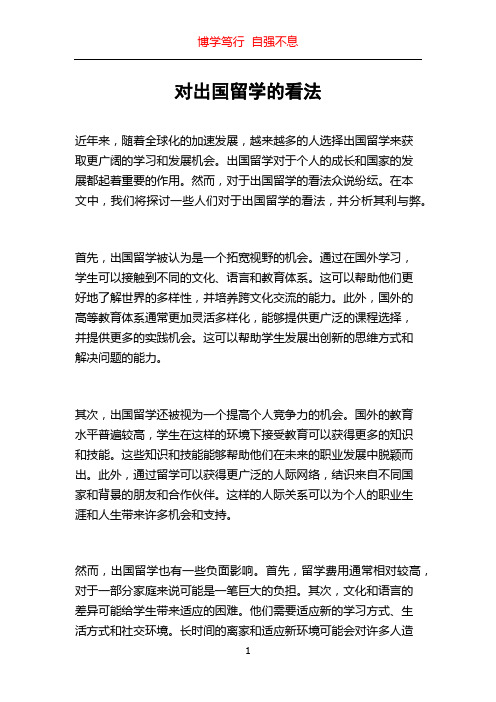
对出国留学的看法近年来,随着全球化的加速发展,越来越多的人选择出国留学来获取更广阔的学习和发展机会。
出国留学对于个人的成长和国家的发展都起着重要的作用。
然而,对于出国留学的看法众说纷纭。
在本文中,我们将探讨一些人们对于出国留学的看法,并分析其利与弊。
首先,出国留学被认为是一个拓宽视野的机会。
通过在国外学习,学生可以接触到不同的文化、语言和教育体系。
这可以帮助他们更好地了解世界的多样性,并培养跨文化交流的能力。
此外,国外的高等教育体系通常更加灵活多样化,能够提供更广泛的课程选择,并提供更多的实践机会。
这可以帮助学生发展出创新的思维方式和解决问题的能力。
其次,出国留学还被视为一个提高个人竞争力的机会。
国外的教育水平普遍较高,学生在这样的环境下接受教育可以获得更多的知识和技能。
这些知识和技能能够帮助他们在未来的职业发展中脱颖而出。
此外,通过留学可以获得更广泛的人际网络,结识来自不同国家和背景的朋友和合作伙伴。
这样的人际关系可以为个人的职业生涯和人生带来许多机会和支持。
然而,出国留学也有一些负面影响。
首先,留学费用通常相对较高,对于一部分家庭来说可能是一笔巨大的负担。
其次,文化和语言的差异可能给学生带来适应的困难。
他们需要适应新的学习方式、生活方式和社交环境。
长时间的离家和适应新环境可能会对许多人造成心理压力。
此外,回国后,留学生可能面临着就业压力和适应国内工作环境的困难。
对于出国留学的看法因个人而异。
有些人认为出国留学是一次宝贵的经历,可以帮助他们开阔眼界,提高自身能力。
他们相信通过留学可以获得更好的教育和职业发展机会。
然而,也有人认为,在国内接受教育并不比出国留学差,而且在就业方面也不一定有差异。
他们认为出国留学所带来的高额费用和风险并不值得。
他们主张在本国就业和学习,并通过其他方式获取国外的学习和交流机会。
总之,出国留学是一个有争议的话题。
它有着许多正面的机会和利益,可以帮助个人发展和国家的进步。
- 1、下载文档前请自行甄别文档内容的完整性,平台不提供额外的编辑、内容补充、找答案等附加服务。
- 2、"仅部分预览"的文档,不可在线预览部分如存在完整性等问题,可反馈申请退款(可完整预览的文档不适用该条件!)。
- 3、如文档侵犯您的权益,请联系客服反馈,我们会尽快为您处理(人工客服工作时间:9:00-18:30)。
大家写毕业论文之前的资料收集是非常重要的一步,三军未动粮草先行。
准备好论点论据,这样你写起来才会行云流水。
现在我介绍下应该注意的五个方面的资料收集要点:
第一,第一手资料。
如果你想要毕业论文更有价值,而不是空谈无法让人信服的文章,第一手资料的收集是极其重要的。
当你在文章提出论点和主张第一手资料更能使文章生动、流畅和可信的。
在文章分析部分会使文章更加的准确和科学的,无论是定量和定性分析,很多导师更喜欢,甚至要求学生使用第一手资料的。
第二,他人的研究成果。
这方面的资料收集对于你论文的思路、研究方向和研究角度是有很大的启发的。
因为毕业研究Topic需要有意义,所以最好能在他人研究成果上出发。
我们首先搞清楚专家们的一些研究结果,我们从此挖掘一些有意义的研究方向。
所以一定要借鉴他人的研究成果,从此找出一些你觉得有意义的、觉得不足或者解决的不满意的,然后在继续研究和探索。
也就是大家一定要多借鉴一些专家的看法,集思广益最终找到自己合适的研究方向。
不要像一只无头苍蝇一样乱撞,这样会让你们很累。
第三,边缘学科的材料。
一篇高质量的文章,边缘学科的理论和知识点支撑也是非常重要的。
比如一篇金融学科的毕业论文,可能要用到管理、经济、人文科学等的知识。
有时候如果能在文章穿插一些其他学科的知识点,可以使文章更具有深度的。
这方面的材料动笔前大家可以先大概了解下,然后在动笔需要的时候再针对性的去查看理解,然后加到文章里面。
掌握边缘学科会让文章的知识面和思路更广阔的,从而提升整个文章的深度。
但是写作的时候切记点到即止,一定要精辟,起到所需作用就可以了,不然很容易让人混乱主次。
第四,名人的有关论述,这方面的资料就是理性材料的收集的一部分。
在论证的时候使用名人的论述会更具有权威性的。
在收集这方面的资料时一定要带有目的性,收集一些在论证中起到作用的,适合某些论点的叙述,不然相关的论述可能太多了,这样可以更节省时间,大家可以一个论点先找2-3个相关论述,这样写起来的时候也很方便的。
第五,背景材料。
为了更好的铺垫内容、研究方法、研究过程和研究方法。
搜集和研究背景材料一定要从多个角度出发,这样会令你思路更加开阔。
也就是你研究一个Topic,你也要同时稍微注意下跟这个Topic相关的其他内容,不要太局限于当前。
这是留学论文宝老师多年的写作经验总结出来的一些基本的资料收集需要,希望能给到为此烦恼的同学们一些灵感或者方向。
如果不清楚的随时可以联系我们。
